Sometimes, superheroes wear capes. Sometimes they wear a mawashi belt.
Hetal Dave — the country’s first and only professional female sumo — testifies to this. Growing up, she watched her ‘Papa’ wear this belt many a time, sometimes to train her, other times to play the opponent. This core memory continues to be etched in the 37-year-old’s mind, as she settles down for a tête-à-tête with The Better India.
Sudhir Dave did not ever want his daughter to give up on her passion for want of a good coach. And so when in 2008, Hetal showed signs of wanting to pursue a career in sumo wrestling, Sudhir made one thing clear. If there wasn’t a coach available, he would become one.
Through her four-year-long career in the Japanese-origin sport, Hetal has enjoyed the resounding cheers of the audience, the thrill of adrenaline while in the dohyo (the ring where sumo wrestling happens), and the adulation of the country. But outshining all of these is one thing — the lengths to which her father went to show his support.
“My father was working when I first got interested in sumo wrestling. The day he decided to be my coach, he to devote all his time to training me,” Hetal recounts. How tough was it to take this life-altering decision on the spur of the moment? Sudhir responds, “Humans have crazy minds and when the mind decides it wants something, nothing is an obstacle anymore.”
Piecing the story together of how she went from being a child who was an ace in judo (Japanese martial arts) to putting India on the sumo wrestling map, she says her parents have always been her biggest inspiration and cheerleaders. In fact, she says, she gets her love for sports from them. “It is in my DNA. My parents lived in a village all their lives. So, in many ways, sport was a big part of their lives. And when I was five years old, it became a big part of mine too.”
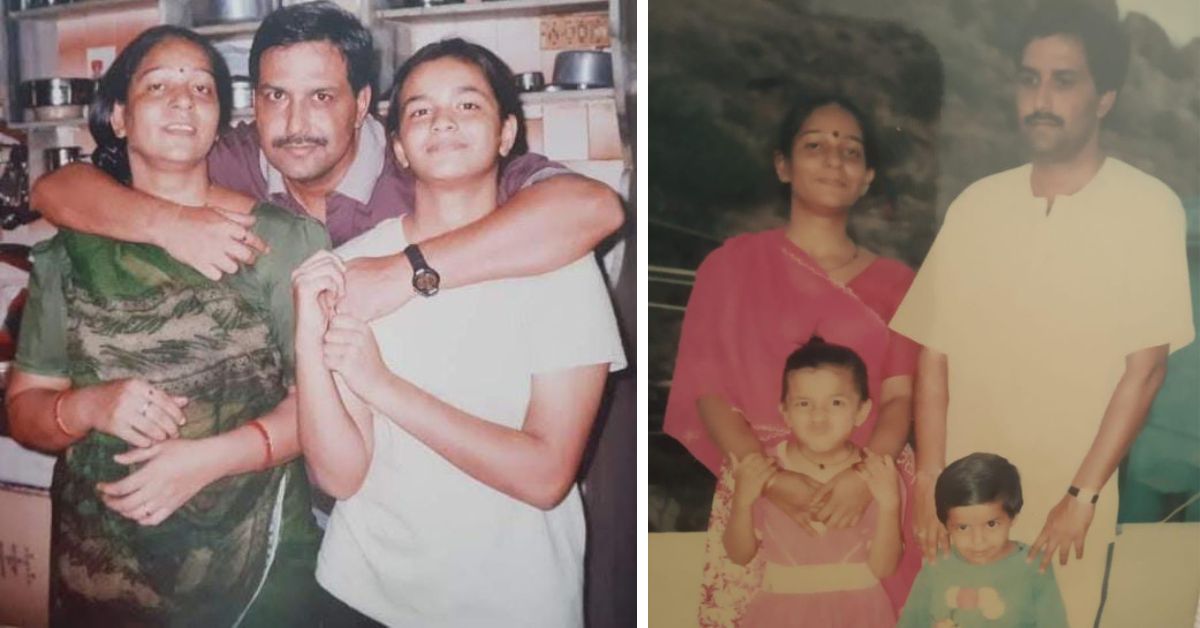
Hetal Dave, India’s only professional female sumo wrestler with her mother, father and brother, Picture source: Hetal
But while the two generations bonded over this passion for sports, circumstances distinguished the fortune of pursuing it.
Hetal explains, “In the village, my parents did not have much exposure to facilities or opportunities. Later on, family responsibilities took over and they couldn’t live their .” So early on, the couple decided they would not let their children face the same fate.
“When my brother and I showed interest in sports, they made sure they were there at every practice sitting on the front row seats,” she adds.
While some days, sports was a passion, other days, it was Hetal’s safe space. Her chubbiness, which had been adored when she was little, was ridiculed as she got older. “Why can’t I just fit in,” she thought many a time, opting to stay at home instead of going out since she did not want to endure endless taunts about her weight.
And so, in isolation, she struck an unusual — albeit special — friendship with sports. It was during this phase that the club Hetal attended for judo organised a sumo wrestling championship. The more she learned about , the more she resonated with it.
“In India, we term people thin and fat. But in Japan, being the latter is not something bad. In fact, if one is a sumo wrestler in Japan, they are not called ‘fat’ but rather, ‘strong’. They are worshipped, they are celebrated, and they are seen as role models,” she informs.
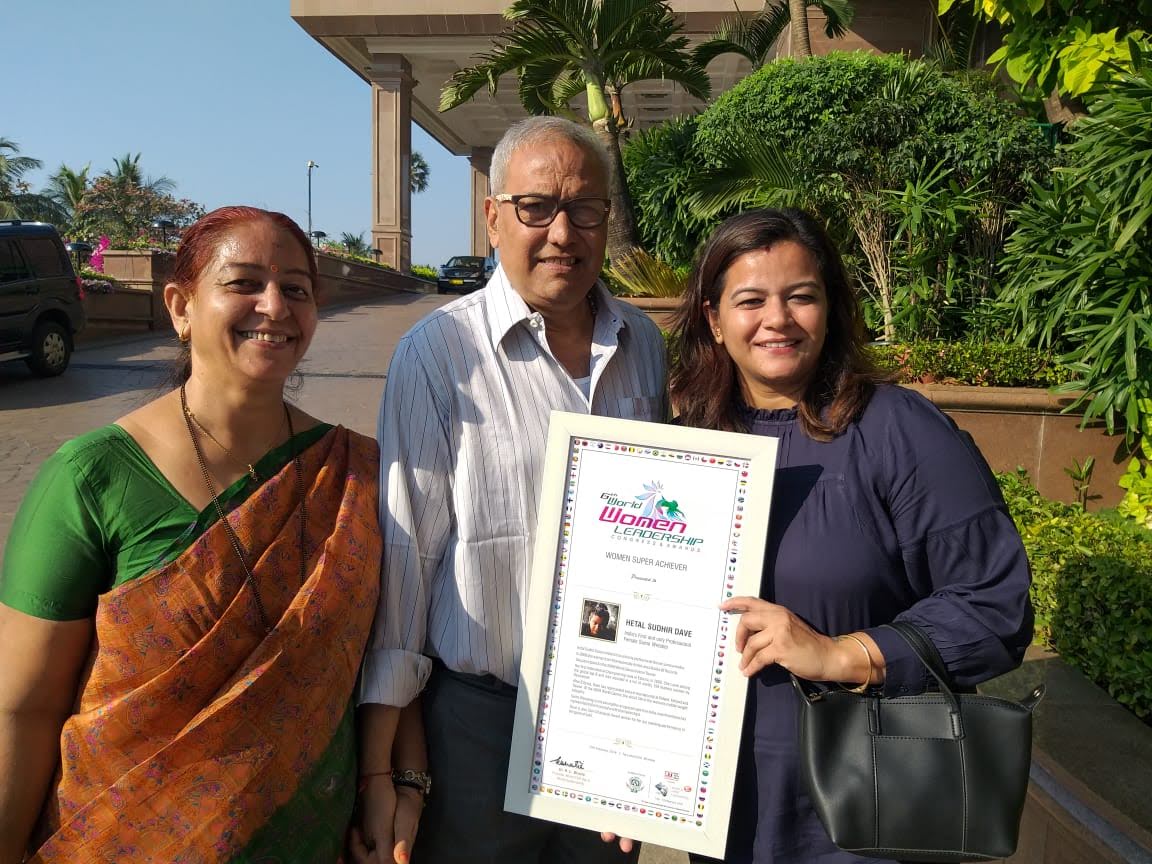
Hetal’s father Sudhir turned coach when his daughter was unable to find a sumo wrestling coach in India, Picture source: Hetal
Unearthing these stories was illuminating for Hetal, who up until now had viewed her weight as a problem. “It made me realise that it was all about perception. From then on, I began to look at my weight as a symbol of strength,” she says.
Stumbling upon sumo wrestling had ignited a fire in Hetal. She spent the next few days in cyber cafes, engrossed in research about the sport. She wanted to learn everything there was to it. But the more she read, the more she was startled to not find mention of any Indian women in the . She decided to find out why.
“I went to the Sumo Wrestling Association in Churchgate, Mumbai, and spoke to them about my dreams of pursuing sumo wrestling professionally,” she recalls. Her enthusiasm was met with reluctance. “They told me that India did not have the infrastructure for the sport and the organisation was not supported by the Government.”
Hetal would have to find her own sponsor if she was keen to follow her dream.
As Hetal details her journey out for me, I cannot ignore the fact that sumo wrestling is a sport steeped in , not just physical but emotional. While Hetal struggled to find a coach to help her with the former, she relied on herself and her family for the latter.
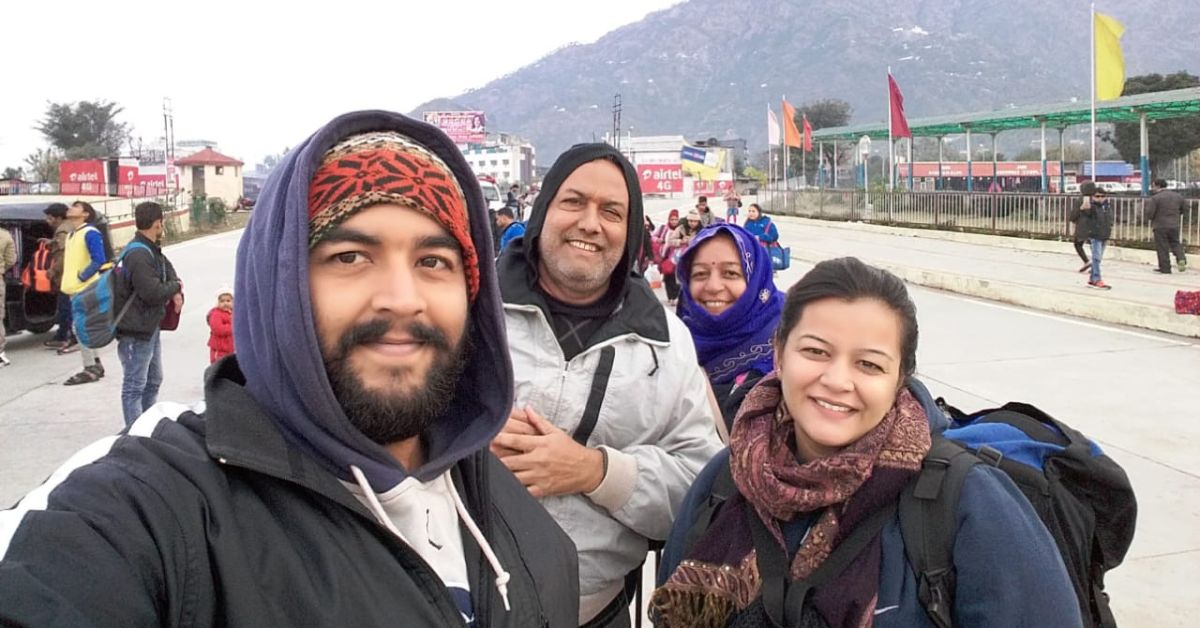
Hetal has always been inspired by her parents who were also passionate about sports, Picture source: Hetal
Many poked fun and taunted her about these lofty dreams. Her father interjects here saying, “Many people would often jeer saying ‘Hetal is a Gujarati girl and only eats daal bhat (steamed rice with cooked lentils). How will she achieve anything in sports with that diet?’” But the unwavering support of her parents and brother helped her tide through. Criticism was put on the back burner as her goal occupied the front — to participate in a sumo wrestling tournament.
A New York Times article in 2022 emphasised how the greatest sports stories are the ones that transcend sports. And Hetal’s is an example. There was a hunger in her to prove to the world that girls can do anything they set out to, even if that sometimes means wrestling in a ring.
“I would write down everything that I learnt from my research. I would watch videos and take notes,” she says. But the chasm between reality and simulation was evident. “How much can one learn from videos? I knew I needed to start to truly learn.”
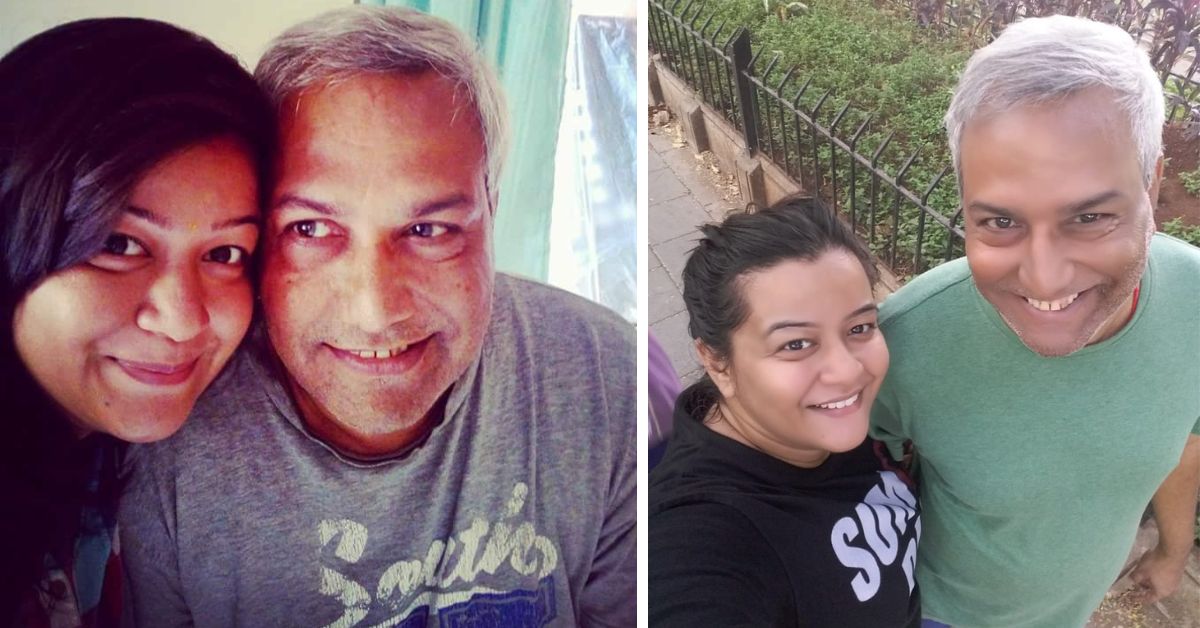
Hetal’s father Sudhir quit his job to devote all his time to coaching his daughter in sumo wrestling, Picture source: Hetal
And this was when Hetals’s father stepped in.
“He saw how passionate I was about sumo wrestling and decided that we’re going to do this together. He bought me a laptop, and every day, we would watch videos on sumo wrestling, study the technique, and then practise. He and my brother would attempt the sport step by step and teach me. We followed this routine from morning to night for weeks. It became a sort of dance, there was a rhythm to it,” she notes.
The trio were relentless in their practice.
Meanwhile, the days leading up to the World Championship (2008) in Estonia were passing quickly and Hetal still hadn’t found a sponsor. Time was running out. But, as she emphasises, help always arrives when you least expect it.
“A local Gujarati newspaper would often write about my achievements, and when I approached them with this dilemma, they put out an article asking if anyone would like to sponsor me to participate in . And many came forward,” she shares.
Just a teenager, the memory of standing on foreign ground when she landed in Estonia is still fresh in Hetal’s mind.
“I was aware that no one from India would be there at the tournament and was nervous. Here I was, going for something that was so new, and in a strange place. While I managed to find a sponsor, the funds were limited, and I had to be extremely careful about budgeting. But while the fear of it all set in, so did luck,” she says.
“The mayor of the town came personally to receive me at the airport and shared how happy he was that someone from India was participating. The organisers saw to it that my vegetarian food preferences were taken care of and that a representative accompanied me at all times so that language barrier wouldn’t be a problem,” she says.
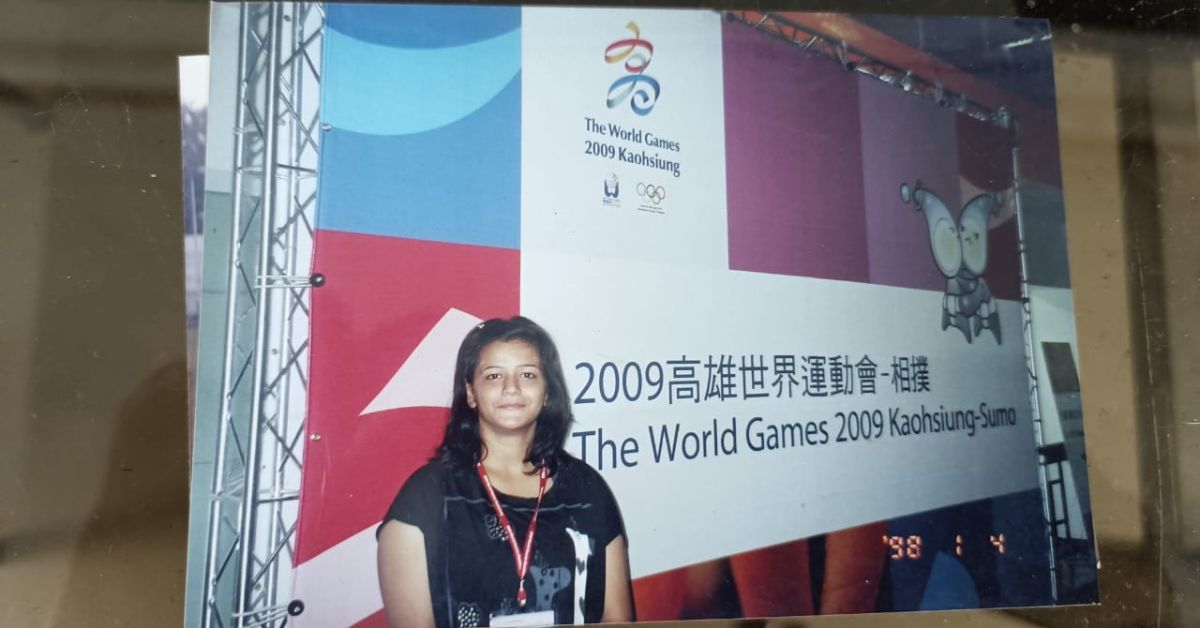
Following the success at the World Championship in 2008, Hetal was selected for World Games in 2009 where she excelled, Picture source: Hetal
As Hetal hadn’t had formal coaching, she was unaware of the mawashi (a sumo belt) that is worn by all wrestlers. “When I told the organisers that I did not have one, they gave me one and taught me how to tie it,” she smiles.
Then she also got to be privy to the rituals that precede .
“I remember sitting intently and watching them train and observing their techniques,” she shares. The weight of the occasion dawned on her, but she points out that all fright lay forgotten when she set foot in the ring for the first time and was met by thunderous applause. “The whole stadium was cheering for me because the announcer had mentioned that I had come all alone from India to participate in the tournament,” she adds.
The story is riveting and gives Hetal goosebumps. The success of this first global opportunity — she was among the top 10 — propelled her towards the ones that followed. At the World Games in 2009, she was the only female athlete from India out of 200 competing athletes.
Following this win, Hetal had to retire in 2012 because of a lack of sponsorship. To this end, she underscores lack of support as the biggest hurdle that stops women from such as sumo wrestling.
The last few years have kept her on her toes with the documentary film ‘Sumo Didi’, directed by Jayant Rohatgi. Hetal’s role in the film is essayed by Shriyam Bhagnani. And Hetal, who personally trained Bhagnani, says the intent was to bring forth every emotion that has coloured the canvas of her journey —
“The pressure to make your country proud, the uncertainty of not knowing the opponent’s next move in the ring, the feeling of being alone sometimes at tournaments and not having anyone to look at in the stands, the desire to prove people who said ‘You’re fat, you cannot do anything in life’ wrong.”
She is hopeful that her story will be a beacon for people to believe in themselves and follow their calling. And behind Hetal stands a proud father who never for once doubted that his daughter would achieve these feats — “Mhari chori chore se kam hai ke?”
And for all those who questioned how Hetal’s simple diet would let her achieve greatness in sports, her father has an answer ready, “Ek marwari ne daal bhat kha ke history bana li (A Marwari girl has created history despite a simple vegetarian diet).”
Edited by Pranita Bhat.
Hetal Dave — the country’s first and only professional female sumo — testifies to this. Growing up, she watched her ‘Papa’ wear this belt many a time, sometimes to train her, other times to play the opponent. This core memory continues to be etched in the 37-year-old’s mind, as she settles down for a tête-à-tête with The Better India.
Sudhir Dave did not ever want his daughter to give up on her passion for want of a good coach. And so when in 2008, Hetal showed signs of wanting to pursue a career in sumo wrestling, Sudhir made one thing clear. If there wasn’t a coach available, he would become one.
Through her four-year-long career in the Japanese-origin sport, Hetal has enjoyed the resounding cheers of the audience, the thrill of adrenaline while in the dohyo (the ring where sumo wrestling happens), and the adulation of the country. But outshining all of these is one thing — the lengths to which her father went to show his support.
“My father was working when I first got interested in sumo wrestling. The day he decided to be my coach, he to devote all his time to training me,” Hetal recounts. How tough was it to take this life-altering decision on the spur of the moment? Sudhir responds, “Humans have crazy minds and when the mind decides it wants something, nothing is an obstacle anymore.”
Piecing the story together of how she went from being a child who was an ace in judo (Japanese martial arts) to putting India on the sumo wrestling map, she says her parents have always been her biggest inspiration and cheerleaders. In fact, she says, she gets her love for sports from them. “It is in my DNA. My parents lived in a village all their lives. So, in many ways, sport was a big part of their lives. And when I was five years old, it became a big part of mine too.”

Hetal Dave, India’s only professional female sumo wrestler with her mother, father and brother, Picture source: Hetal
But while the two generations bonded over this passion for sports, circumstances distinguished the fortune of pursuing it.
Hetal explains, “In the village, my parents did not have much exposure to facilities or opportunities. Later on, family responsibilities took over and they couldn’t live their .” So early on, the couple decided they would not let their children face the same fate.
“When my brother and I showed interest in sports, they made sure they were there at every practice sitting on the front row seats,” she adds.
While some days, sports was a passion, other days, it was Hetal’s safe space. Her chubbiness, which had been adored when she was little, was ridiculed as she got older. “Why can’t I just fit in,” she thought many a time, opting to stay at home instead of going out since she did not want to endure endless taunts about her weight.
And so, in isolation, she struck an unusual — albeit special — friendship with sports. It was during this phase that the club Hetal attended for judo organised a sumo wrestling championship. The more she learned about , the more she resonated with it.
“In India, we term people thin and fat. But in Japan, being the latter is not something bad. In fact, if one is a sumo wrestler in Japan, they are not called ‘fat’ but rather, ‘strong’. They are worshipped, they are celebrated, and they are seen as role models,” she informs.

Hetal’s father Sudhir turned coach when his daughter was unable to find a sumo wrestling coach in India, Picture source: Hetal
Unearthing these stories was illuminating for Hetal, who up until now had viewed her weight as a problem. “It made me realise that it was all about perception. From then on, I began to look at my weight as a symbol of strength,” she says.
Stumbling upon sumo wrestling had ignited a fire in Hetal. She spent the next few days in cyber cafes, engrossed in research about the sport. She wanted to learn everything there was to it. But the more she read, the more she was startled to not find mention of any Indian women in the . She decided to find out why.
“I went to the Sumo Wrestling Association in Churchgate, Mumbai, and spoke to them about my dreams of pursuing sumo wrestling professionally,” she recalls. Her enthusiasm was met with reluctance. “They told me that India did not have the infrastructure for the sport and the organisation was not supported by the Government.”
Hetal would have to find her own sponsor if she was keen to follow her dream.
From her Mumbai home to the sumo rings of Estonia
As Hetal details her journey out for me, I cannot ignore the fact that sumo wrestling is a sport steeped in , not just physical but emotional. While Hetal struggled to find a coach to help her with the former, she relied on herself and her family for the latter.

Hetal has always been inspired by her parents who were also passionate about sports, Picture source: Hetal
Many poked fun and taunted her about these lofty dreams. Her father interjects here saying, “Many people would often jeer saying ‘Hetal is a Gujarati girl and only eats daal bhat (steamed rice with cooked lentils). How will she achieve anything in sports with that diet?’” But the unwavering support of her parents and brother helped her tide through. Criticism was put on the back burner as her goal occupied the front — to participate in a sumo wrestling tournament.
A New York Times article in 2022 emphasised how the greatest sports stories are the ones that transcend sports. And Hetal’s is an example. There was a hunger in her to prove to the world that girls can do anything they set out to, even if that sometimes means wrestling in a ring.
“I would write down everything that I learnt from my research. I would watch videos and take notes,” she says. But the chasm between reality and simulation was evident. “How much can one learn from videos? I knew I needed to start to truly learn.”

Hetal’s father Sudhir quit his job to devote all his time to coaching his daughter in sumo wrestling, Picture source: Hetal
And this was when Hetals’s father stepped in.
“He saw how passionate I was about sumo wrestling and decided that we’re going to do this together. He bought me a laptop, and every day, we would watch videos on sumo wrestling, study the technique, and then practise. He and my brother would attempt the sport step by step and teach me. We followed this routine from morning to night for weeks. It became a sort of dance, there was a rhythm to it,” she notes.
The trio were relentless in their practice.
Meanwhile, the days leading up to the World Championship (2008) in Estonia were passing quickly and Hetal still hadn’t found a sponsor. Time was running out. But, as she emphasises, help always arrives when you least expect it.
“A local Gujarati newspaper would often write about my achievements, and when I approached them with this dilemma, they put out an article asking if anyone would like to sponsor me to participate in . And many came forward,” she shares.
‘I was celebrated for my strength’
Just a teenager, the memory of standing on foreign ground when she landed in Estonia is still fresh in Hetal’s mind.
“I was aware that no one from India would be there at the tournament and was nervous. Here I was, going for something that was so new, and in a strange place. While I managed to find a sponsor, the funds were limited, and I had to be extremely careful about budgeting. But while the fear of it all set in, so did luck,” she says.
“The mayor of the town came personally to receive me at the airport and shared how happy he was that someone from India was participating. The organisers saw to it that my vegetarian food preferences were taken care of and that a representative accompanied me at all times so that language barrier wouldn’t be a problem,” she says.

Following the success at the World Championship in 2008, Hetal was selected for World Games in 2009 where she excelled, Picture source: Hetal
As Hetal hadn’t had formal coaching, she was unaware of the mawashi (a sumo belt) that is worn by all wrestlers. “When I told the organisers that I did not have one, they gave me one and taught me how to tie it,” she smiles.
Then she also got to be privy to the rituals that precede .
“I remember sitting intently and watching them train and observing their techniques,” she shares. The weight of the occasion dawned on her, but she points out that all fright lay forgotten when she set foot in the ring for the first time and was met by thunderous applause. “The whole stadium was cheering for me because the announcer had mentioned that I had come all alone from India to participate in the tournament,” she adds.
The story is riveting and gives Hetal goosebumps. The success of this first global opportunity — she was among the top 10 — propelled her towards the ones that followed. At the World Games in 2009, she was the only female athlete from India out of 200 competing athletes.
Following this win, Hetal had to retire in 2012 because of a lack of sponsorship. To this end, she underscores lack of support as the biggest hurdle that stops women from such as sumo wrestling.
The last few years have kept her on her toes with the documentary film ‘Sumo Didi’, directed by Jayant Rohatgi. Hetal’s role in the film is essayed by Shriyam Bhagnani. And Hetal, who personally trained Bhagnani, says the intent was to bring forth every emotion that has coloured the canvas of her journey —
“The pressure to make your country proud, the uncertainty of not knowing the opponent’s next move in the ring, the feeling of being alone sometimes at tournaments and not having anyone to look at in the stands, the desire to prove people who said ‘You’re fat, you cannot do anything in life’ wrong.”
She is hopeful that her story will be a beacon for people to believe in themselves and follow their calling. And behind Hetal stands a proud father who never for once doubted that his daughter would achieve these feats — “Mhari chori chore se kam hai ke?”
And for all those who questioned how Hetal’s simple diet would let her achieve greatness in sports, her father has an answer ready, “Ek marwari ne daal bhat kha ke history bana li (A Marwari girl has created history despite a simple vegetarian diet).”
Edited by Pranita Bhat.
